PALO ALTO, Calif. (Reuters) - The Federal Reserve is taking a look at a broad range of problems around digital payments and currencies, including policy, style and legal factors to consider around possibly releasing its own digital currency, Governor Lael Brainard said on Wednesday. Brainard's remarks suggest more openness to the possibility of a Fed-issued digital coin than in the past." By transforming payments, digitalization has the possible to deliver greater worth and convenience at lower cost," Brainard stated at a conference on payments at the Stanford Graduate School of Organization.
Reserve banks internationally are disputing how to handle digital financing innovation and the dispersed journal systems used by bitcoin, which promises near-instantaneous payment at possibly low expense. The Fed is establishing its own round-the-clock real-time payments and settlement service and is presently examining 200 comment letters sent late last year about the proposed service's style and scope, Brainard said.
Less than two years ago Brainard told a conference in San Francisco that there is "no engaging showed need" for such a coin. However that was before the scope of Facebook's digital currency ambitions were widely understood. Fed authorities, including Brainard, have actually raised concerns about customer securities and data and personal privacy threats that could be posed by a currency that could come into usage by the 3rd of the world's population that have Facebook accounts.
" We are collaborating with other reserve banks as we advance our understanding of reserve bank digital currencies," she stated. With more nations checking out issuing their own digital currencies, Brainard stated, that adds to "a set of factors to likewise be making sure that we are that frontier of both research and policy development." In the United States, Brainard stated, issues that require research study consist of whether a digital currency would make the payments system much safer or simpler, and whether it might present financial stability threats, consisting of the possibility of bank runs if money can be turned "with a single swipe" into the central bank's digital currency.
To counter the monetary damage from America's unprecedented nationwide lockdown, the Federal Reserve has taken unmatched steps, including flooding the economy with dollars and investing directly in the economy. Many of these moves received grudging acceptance even from many Fed skeptics, as they saw this stimulus as needed and something just the Fed might do.
My brand-new CEI report, "Government-Run Payment Systems Are Hazardous at Any Speed: The Case Against Fedcoin and FedNow," information the dangers of the Fed's present prepare for its FedNow real-time payment system, and proposals for central bank-issued cryptocurrency that have been called Fedcoin or the "digital dollar." In my report, I discuss concerns about personal privacy, data security, currency control, and crowding out private-sector competitors and development.

Supporters of FedNow and Fedcoin state the federal government must create a system for payments to deposit instantly, rather than encourage such systems in the economic sector by lifting regulatory barriers. But as noted in the paper, the personal sector is offering a seemingly limitless supply of payment technologies and digital currencies to solve the problemto the degree it is a problemof the time space between when a payment is sent and when it fedcoin july 2020 is gotten in a bank account.
And the examples of private-sector innovation in this area are numerous. The Cleaning Home, a bank-held cooperative that has actually been routing interbank payments in various forms for more than 150 years, has been clearing real-time payments since 2017. By the end of 2018 it View website was covering 50 percent of the deposit base in the U.S.